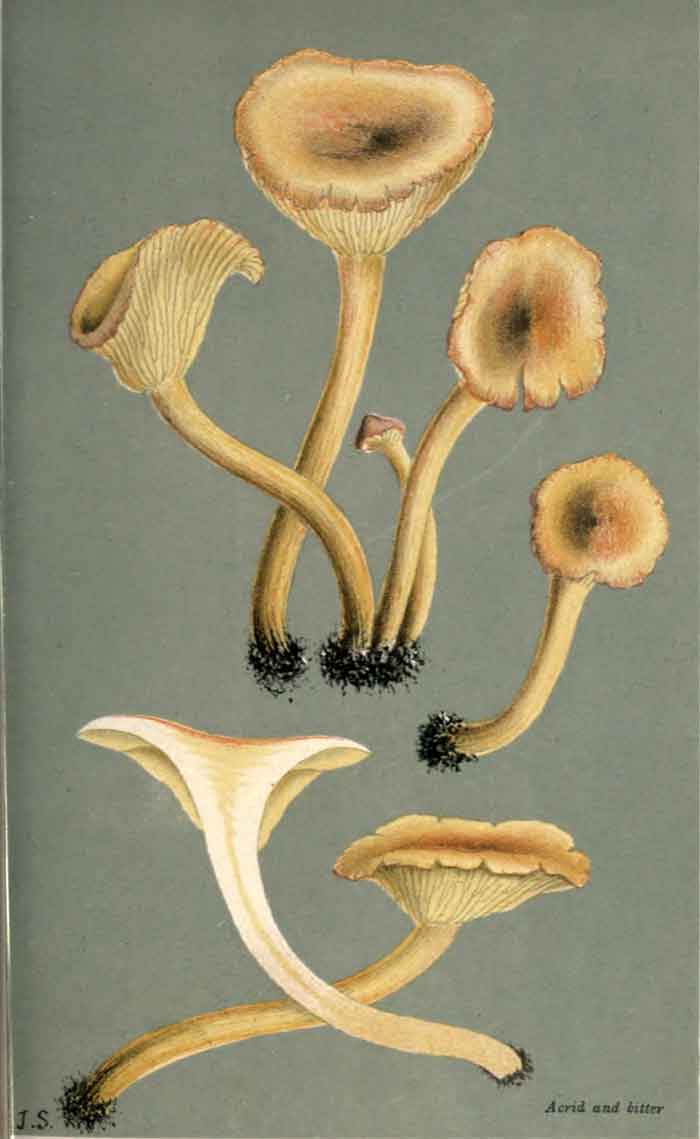Superregnum: Eukaryota
Regnum: Fungi
Subregnum: Dikarya
Divisio: Basidiomycota
Subdivisio: Agaricomycotina
Classis: Agaricomycetes
Subclassis: Agaricomycetidae
Ordo: Agaricales
Subordo: Agaricineae
Familia: Strophariaceae
Genus: Hypholoma
Species: H. capnoides – H. fasciculare – H. lateritium
Name
Hypholoma (Fr.) P. Kumm., 1871
Type Species: Hypholoma fasciculare (Huds.) P. Kumm., 1871
References
Primary references
Kummer, P. 1871. Der Führer in die Pilzkunde. :1-146
Links
Index Fungorum: IF 17828
MycoBank: MB 17828
Vernacular names
русский: Бахромчатка, Гифолома

Hypholoma fasciculare
Hypholoma is a genus of fungi which are quite well known due to the commonness of sulphur tuft (Hypholoma fasciculare) on stumps in temperate woodlands. Species in this genus are easily recognizable because the dark spores create a distinctive greenish effect on the yellow cap underside. Hypholoma means "mushrooms with threads" because of the thread-like veil that connects the cap to the stem when young and for the bundles of rhizomorphs which radiate outwards from the stem base.[2] Other well-known species are H. capnoides and H. lateritium.
Synonyms
Sometimes Hypholoma has not been considered a genus in its own right, but it has been grouped together with Stropharia and Psilocybe under the name of Geophila, Naematoloma, or Nematoloma.
General characteristics
The fruiting bodies mostly have a central stipe. Some are medium-sized and there are also smaller species. The caps range in colour from yellow/brown to brick red.
The spore colour is dark brown to black.
The cap is smooth.
The developing mushroom is enveloped in a veil, but in Hypholoma this can be seen only in very young examples. This means that there is no well-defined ring, and nor are there distinctive flakes on the cap, but there may be cottony ring zones on the stipe, sometimes coloured by the dark spores.
The genus is widespread throughout the world and its best known representatives grow on dead wood, whilst some others grow in moss, sometimes on moors.
Species
H. acutum
H. aporum
H. australe
H. australianum
H. brunneum
H. californicum
H. capnoides
H. castilloi
H. confusum
H. dispersum
H. elongatum
H. epixanthum
H. ericaeoides
H. ericaeum
H. eximium
H. fasciculare
H. flavorhizum
H. flavovirens
H. fragile
H. frowardii
H. laeticolor
H. lateritium
H. litorale
H. marginatum
H. murinacea
H. myosotis
H. ornellum
H. peckianum
H. peregrinum
H. perplexum
H. polylepidis
H. polytrichi
H. popperianum
H. puiggarii
H. radicosoides
H. radicosum
H. rickenii
H. rubrococcineum
H. solitarium
H. subdispersum
H. subericaeum
H. subviride
H. vinosum
H. xanthocephalum
See also
List of Agaricales genera
References
"Hypholoma (Fr.) P.Kumm. 1871". MycoBank. International Mycological Association. Retrieved 2010-10-29.
Paul Stamets, Growing gourmet and medicinal mushrooms, p. 239, Ten Speed Press, 3rd ed. (2000), ISBN 1-58008-175-4
Retrieved from "http://en.wikipedia.org/"
All text is available under the terms of the GNU Free Documentation License

